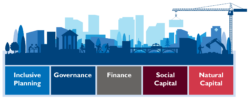Urban resilience approaches aim to address today’s problems while embedding a long-term vision that anticipates future risk scenarios, driven by climate change or other increasing risks.
Building Blocks to Strengthen Urban Resilience
Based on global experience and best practice, USAID has developed the following cross-cutting “building blocks” that can be applied to integrated programming across sectors, as well as to sector-specific programming, to increase the resilience of urban systems:
- Inclusive Planning: Planning for resilience necessitates inclusive, democratic, equitable, evidence-based processes that account for future risk. USAID should assist cities in formulating evidence-based plans and actions, in consultation with relevant communities, that holistically address past and future shocks and stresses.
- Governance: Strengthening urban governance is central to the effective and inclusive delivery of basic services during and after shocks and stresses. This includes strengthening the capacity of cities to improve and enforce land use, zoning and other plans and regulations; improving community engagement; strengthening communication, transparency and accountability; and aligning across the diverse actors and levels (national/subnational) that contribute to urban governance. USAID is well-positioned to help strengthen local governance systems in support of urban resilience.
- Finance: Actions to build resilience often require far more financial resources than city governments can mobilize on their own. USAID should assist with strengthening the financial management capacity (e.g., resource mobilization and use, development of blended finance solutions) of cities and help them unlock financial capital for the physical and social infrastructure needed to support resilience. USAID should also support efforts to increase access to finance at the household level.
- Social Capital: The networks of relationships and bonds within and across individuals, communities and institutions enable societies to function effectively. USAID should examine what relationships are important for leveraging social capital in the face of stresses and
shocks, and identify relationships that could be strengthened to increase social capital, especially those that promote diverse groups of community members working together and helping each other when crisis hits. - Natural Capital: Restore and protect the natural systems that can contribute to resilience. Natural capital and environmental assets—including open space, forests, biodiversity, and wetlands, both inside and outside of the city’s boundaries— can provide protection from shocks and stresses. USAID should promote the use of nature-based solutions to improve resilience, including urban green infrastructure

While evidence suggests that cities benefit from shared core approaches to become more resilient—no matter the specific shocks and stresses they face – urban systems differ across contexts and between metropolitan areas, secondary cities, or towns. A context-specific analysis is needed before designing interventions to build resilience.
Actions and program interventions should be inclusive of the actors (people and institutions) and address the factors (infrastructure, finances, policies and environmental conditions) that drive resilience of urban systems. Therefore, application of these building blocks should consider the local context to respond to the needs and conditions of the urban area under consideration.
- Read the full Urban Resilience Technical Guidance.
CONTACT US
A variety of units have technical expertise related to urban resilience, including the Environment, Energy and Infrastructure Center; the Democracy, Rights and Governance Center; the Resilience and Food Security Bureau; and regional bureaus like Asia Bureau. USAID’s internal Urban Resilience Working Group includes a variety of experts who are available to provide support at either the conceptual/design phase, or during implementation. DDI/EEI Green Cities Division serves as a focal point.
Please send your questions or request to:
- Monica Bansal, Green Cities Division Lead, at: mbansal@usaid.gov.
- Rebecca Chacko, Climate and Cross-sectoral Strategies, at rchacko@usaid.gov.

